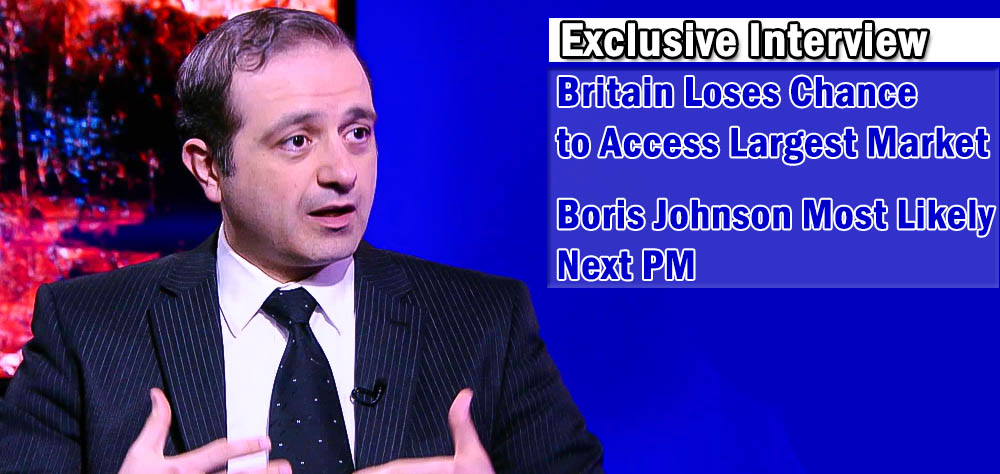Alwaght- The Alwaght News and Analysis Agency has arranged an interview with Ammar Waqaaf, the British affairs analyst and the member of the Syrian Society in Britain, on a couple of issues concerning the Brexit results including consequences and reasons of the vote and the prime minister post and the most likely choices after PM David Cameron’s expected resignation in October.
Alwaght: Why do you think the British people chose to quit the EU?
Waqaaf: The major push is the challenge of the refugees which is the most crucial issue of the current decade, as a result of which nearly 3 million refugees coming from Eastern Europe arrived in UK, where they resided and started working. This put huge strains on the infrastructures in Britain. The Britons are also afraid of what could happen later as new countries from Eastern Europe like Bulgaria are going to join the European bloc. There are refugee’s problems in Europe due to the immigration of the Syrians, Iraqis, Afghans, Somalis, and the others via sea. The people in Britain became worried that they could get caught in the heart of the crisis very soon and so would have no way but dealing with it. So, I think that this issue was the key push for the Britons to decide to leave the European Union.
Alwaght: What are the immediate consequences of leaving the EU for Britain itself? Is Britain now under threat of split after the Scottish people got back their hopes for independence from Britain as they are willing to stay in the European bloc?
Waqaaf: First of all and concerning the second part of your question I would like to start with Scotland. The Scottish National Party found an opportunity in the British referendum and specifically in vote in Scotland where a two third of the people voted to stay part of the EU, just contrary to what Britain did. So, it seeks to use this voting gap to reconsider Scotland’s independence by arguing that the Scottish want to remain in the EU, so why they should be obliged to quit as it has to do with deciding on their fate, and they don't want it. This could prepare the ground for second independence vote in Scotland. So, there exists a real danger. The First Minister of Scotland said that they would make necessary preparations and consultations concerning holding independence referendum. So, this party which holds the majority in the Scottish parliament wants to finalize its stance on the issue.
But concerning repercussions of leave vote on UK, certainly the multitude of the problems puts the kingdom ahead of an array of challenges the most significant of them is economic. The country would lose the chance to access the world's largest market. It has to pay additional costs that would weaken the British producers and so make them lose the power to compete. There are a lot of giant companies in Britain that are exporting their products to the EU, but now they have to transfer their headquarters to inside the EU to keep their influence in the European markets without paying any customs taxes. Furthermore, there is a lot of uncertainty on the additional economic outcomes of this quitting.
Alwaght: What are the effects of this split of Britain from the EU on the US influence in the great European bloc and the decision making there, having in mind that Britain is the close friend of the US among the European countries
Waqaaf: The US didn't hide its willingness to have Britain in the EU, because it needs a voice inside the EU that close to it, but we ultimately know that Washington is leading the NATO. Concerning the security issues and the likes, Washington deals with the global issues and challenges in association with the military organization. In fact, no considerable changes would take place after Britain's leaving, unless a real European conflict Britain erupts.
Alwaght: Do you think that this British move would push the US to consolidate relations with other European countries to keep its sway in the European bloc and hold an influence power in front of Germany which in some cases outstrips the US in terms of decision making?
Waqaaf: I don't think so. As I said before concerning the military and security matters, NATO has the upper hand as it is a military organization with nearly half a century of activity. There would be no change unless there sparks a dispute between Britain and the EU. This puts Washington ahead of a critical situation urging it to make a move.
Alwaght: Do you think this British split encourages other European countries to take the same steps?
Waqaaf: Not other European countries but right-wing movements, as it appears that the right-wing British movements have won the quitting vote, the Eurosceptic right-wing party UK Independence Party (UKIP). If we wish to choose a key figure of the referendum we can pick Nigel Farage, the leader of UKIP. It was him who announced the “victory” in getting the country out of the EU. There are other figures like him in other European countries like Marine le Pen, the president of the National Front political party, and also in Netherlands and even other countries. They hold the same agendas as those of the British right-wing parties concerning the rejection of the refugees and the need to establish borders. They don't want the Eastern Europe countries, as they don't want to receive refugees from Afghanistan and Syria and other countries. They also oppose Turkey joining the EU. These are common agendas and ideas. This British referendum allures them into demanding their countries to take the same steps.
But there is something special about the British case. Britain is not part of the Schengen Agreement, and geographically the British island is separated from the Continent. This gives the others a smaller chances of leaving the EU. For example, how could France close down its borders while it is connected to several countries? But yes this vote would tempt some movements in Europe but nobody wants rushing all to see the British consequences of leaving the EU. The EU has begun to take tough positions to block other European countries from even thinking about split from the bloc. Perhaps it wants to make Britain an example for all those which think about leaving the Union. Therefore, the British vote would have positive effects concerning consolidation of European unity after nearly ten years of the economic crisis and also after the recession in economy of Greece, Cyprus, Italy, Spain, and Southern Europe countries. So, consolidation of European unity is one of the effects of Britain quitting that the EU never dreamed of.
Alwaght: Who do you think is the most likely choice to take place of David Cameron as prime minister?
Waqaaf: It is a bit uncertain. The British Prime Minister David Cameron has confined his successor to his party, namely he would resign and leave the choice for the Conservatives to decide on who comes after him, but they wouldn't call for snap elections. It is very likely that Boris Johnson is the choice for post of prime minister. He led the “Leave Campaign “inside the Conservative Party. There is also Theresa May who was beside David Cameron in “Stay Campaign.” She could have a chance of becoming new prime minister. However, Johnson is the most likely successor of Cameron. But there is a problem concerning the entitlement which is given to the prime minister of Britain. This problem took place when Tony Blair resigned and came after him Gordon Brown who passed two years while everybody in Britain argued that he was not given any entitlement by people, namely Tony Blair was the head of Labour Party when people voted for it not Gordon Brown. If it was Brown people didn't vote for Labour Party at that time. This problem could push Boris Johnson to call for early election, and then we would see who would become next prime minister. But now Johnson is the most likely choice. According to the constitution, the ruling party would make consultations and pick someone as its leader to later become prime minister of Britain.



























